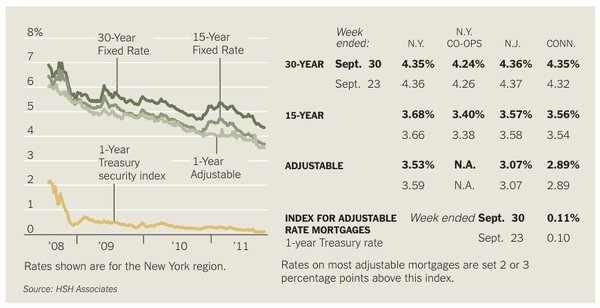Why you may be rejected for a Home Loan
Banks offer cash for completed short sales
October 10, 2011Is Supply vs. Demand Hurting San Diego Housing?
October 24, 2011Why you may be rejected for a Home Loan
“WE regret to inform you…” Nobody applying for a new mortgage or a refinancing wants to see or hear these words. But last year more than two million people were turned down for home loans, according to federal data, often because they didn’t meet certain lender requirements or because their applications were incomplete or otherwise problematic.
And that number, from the Federal Financial Institutions Examination Council, doesn’t even include those who abandon the often-complicated mortgage qualification process. The Mortgage Bankers Association estimates that about half of those who try to refinance and 30 percent of buyers are either denied or drop out.
“A lot of people have credit banged up,” said Michael Fratantoni, the association’s vice president for research and economics.
 Lenders’ underwriting criteria have become more rigorous in recent years; some banks have tightened up beyond federal requirements. Here are the six biggest triggers for rejection, according to industry experts.
Lenders’ underwriting criteria have become more rigorous in recent years; some banks have tightened up beyond federal requirements. Here are the six biggest triggers for rejection, according to industry experts.
INSUFFICIENT INCOME Lenders want to make sure you can afford to make the mortgage payments. Someone who earns, say, $40,000 a year need not bid on a $750,000 apartment, unless there’s a trust fund with quarterly payouts or other money available. Also, lenders typically look for at least a two-year track record of income, which could hurt those who may have switched jobs recently. “It’s common to get turned down if you have a gap in employment history over the last two years,” said Erin Lantz, the director of the Zillow Mortgage Marketplace, an online loan-matching service.
CLOUDY FINANCIAL PICTURE Generally, total debt payments, including the mortgage, cannot exceed 45 to 50 percent of your adjusted gross monthly income. Borrowers may be surprised at what counts and what doesn’t. Overtime and bonuses are included only if you’ve worked for the same employer at least two years, and have a history of receiving them, said Mark Lazar, who with his wife, Anna, owns Allied Financial, a mortgage brokerage in River Edge, N.J. Lenders may also disallow rental income from a property you own, unless you have at least 30 percent equity in it, he said.
BAD CREDIT Lenders typically reject applicants with a FICO score below 620, Mrs. Lantz said. “Some lenders would draw the line a little higher, closer to 660,” she added, citing Zillow data that show about a third of Americans have credit scores so low they are unlikely to obtain any mortgage. Failing to pay your mortgage on time affects your score. “If you have late payments within the last 24 months on,” said Marisol Torruella, a loan originator with the New York Municipal Credit Union, “the likelihood of getting another mortgage is less.”
LOW APPRAISAL You may think the home you’re refinancing or buying is worth around $800,000, but the appraiser says it’s closer to $700,000. Suddenly your new mortgage is in jeopardy. This is the predominant reason people are denied home loans today, according to industry experts.
PROPERTY PROBLEMS Sometimes, Mr. Lazar said, issues turn up within a building, apartment unit or house, like a major repair or safety problem that needs to be addressed before an application can be approved. Other times, he said, it may be financial woes within a condominium or co-op, like having a large number of owners delinquent on their fees, or unfinished common areas or amenities.
INFORMATION MIX-UPS About 12 percent of new mortgage applications were denied because of unverifiable information or incomplete credit applications, according to the Federal Financial Institutions Examination Council. This also may include misinformation: If you’re renting out the property that you want to refinance, your application for an owner-occupied loan can be rejected, Mr. Fratantoni said.
Source: nytimes.com
